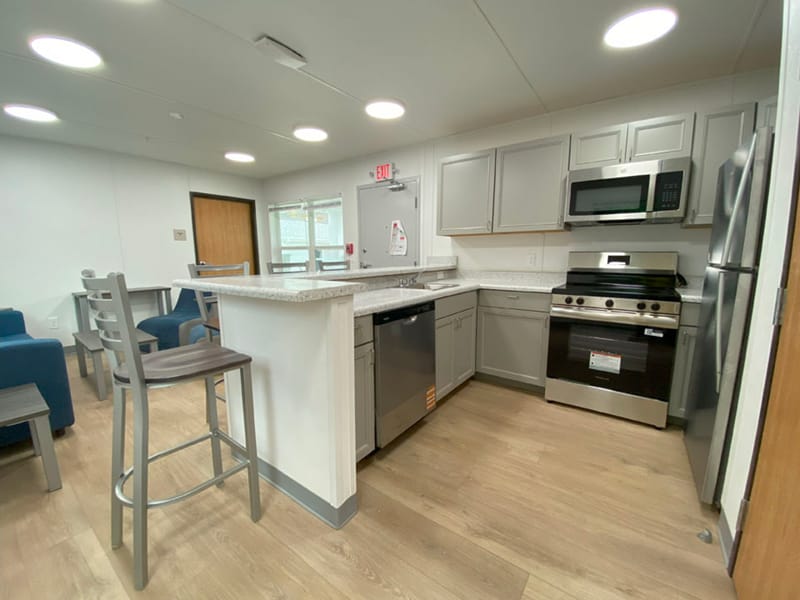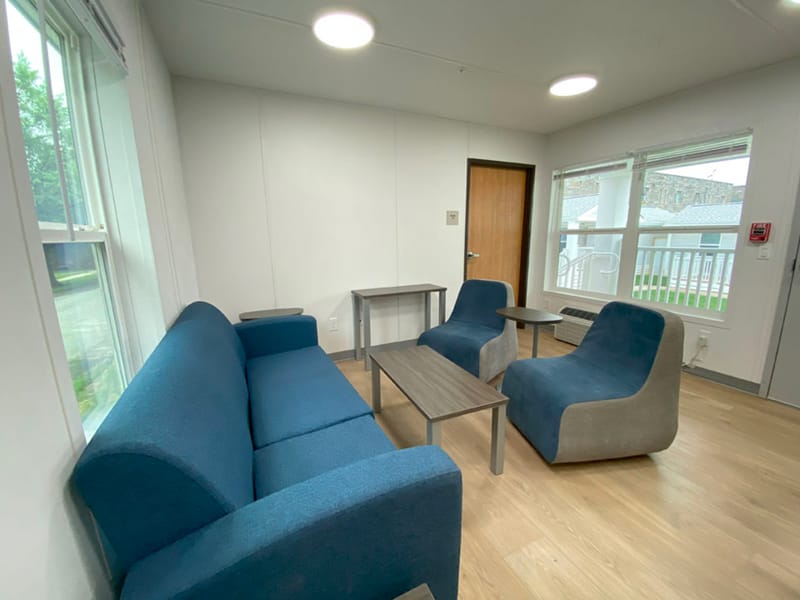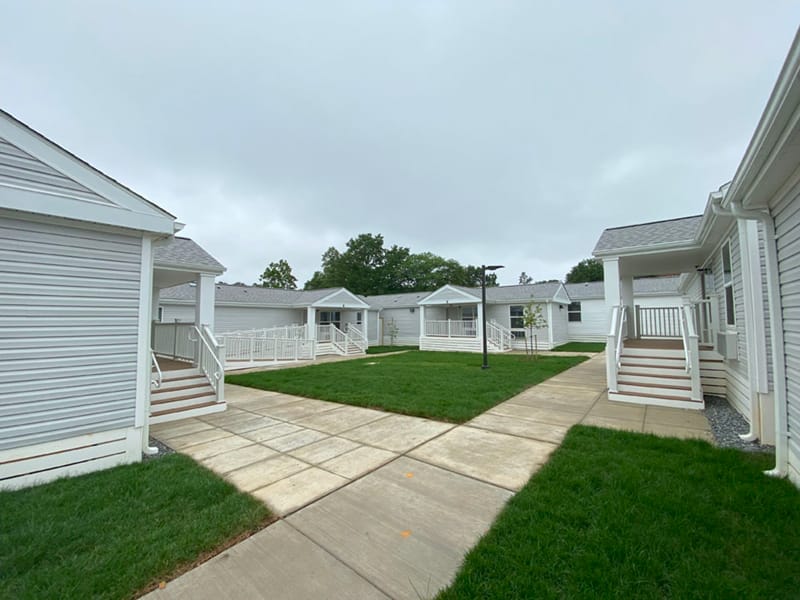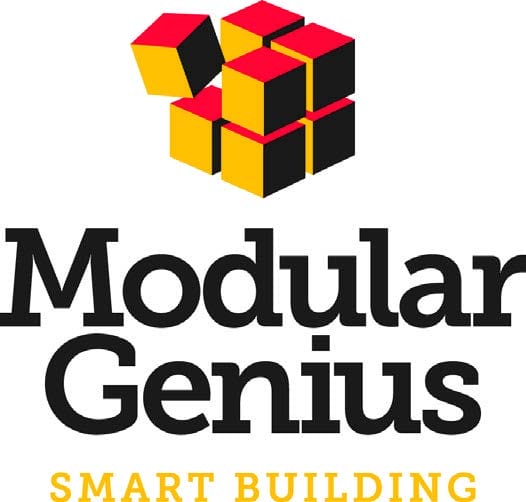Faster, Smarter, Custom-Built: A New Era of Student Housing
To support its ambitious enrollment growth plan, Catholic University turned to Modular Genius for a solution that could rapidly and effectively expand its on-campus housing. Facing the challenge of accommodating over 100 students before the start of the academic term, the university needed a solution that was fast, attractive, ADA-compliant, and community-oriented, all without major disruptions to campus life.
Modular Genius delivered a 25,000+ square foot modular student housing complex made up of 22 buildings: 19 cottage-style units and two larger traditional hall-style dormitory buildings, totaling 124 student beds. This courtyard-style layout was designed to encourage a sense of community, while the exterior and interior finishes ensured the buildings reflected a modern and permanent aesthetic.
“These buildings don’t look like trailers, they look like homes,” said Jim Clark, on-site superintendent. “They remind me of something you’d see in a beach community, almost like an Airbnb. The big porches and layout really invite students to interact outdoors and create community.”
The project included full kitchens with electric ranges, dishwashers, microwaves, and washer/dryer units; ADA-accessible ramps and steps; covered porches with Trex decking; and PVC railings and skirting to match the campus. Inside, each cottage unit featured luxury vinyl plank flooring, private bathrooms, and open-plan living areas. Each building also included HVAC units per room, gutters and downspouts, and fire suppression systems.


“This was more than a cookie-cutter deployment,” noted Senior Project Manager Al Hayes. “Because of the inward-facing courtyard design, we had to customize every building to fit its orientation, from window and door placement to floodlight locations and MEP adjustments.
That level of customization speaks to the care we bring to every student housing project.” Hayes, who is also a proud alumnus of Catholic University, played a personal role in bringing the campus vision to life.
Catholic University had previously used modular buildings on this same footprint in the 1990s and early 2000s, but this new project reflects how far modular construction has come. “The goal was to expand enrollment from 6,000 to 10,000 students over the next decade,” said Business Development Manager Michael Whitehead. “They couldn’t wait the 7 to 10 years it would take to build traditional dormitories. This project, from first contact to occupancy, took under two years. That’s the power of modular.”
This wasn’t Modular Genius’s first collaboration with Catholic University. In 2020, the team delivered a four-unit swing space during the pandemic, another award-winning project. Additionally, the architect on this new project had previously partnered with Modular Genius at Virginia State University, a job that also earned industry recognition.
“That referral shows how trust, results, and relationships in this industry can lead to the next opportunity,” said Hayes.
Today, Catholic University students enjoy safe, modern housing that enhances their experience and supports the school’s long-term growth. The project is yet another example of how Modular Genius continues to redefine what’s possible in modular student housing.
More from Modular Advantage
AoRa Development Aims for New York’s First Triple Net Zero Building Using Modular Methods
More cities are providing funding for newer infrastructure projects as long as they meet sustainability requirements. This is how modular can fit the bill, thanks to its lower waste production.
Developers and Designers: Lessons Learned with Modular Design
Modular construction is attractive to many developers because sitework and module construction can occur simultaneously, shortening the schedule and reducing additional costs.
UTILE: Putting Modular Building on a Fast Track
In Quebec, UTILE is taking the lead in creating affordable modular buildings to help decrease the student housing shortage. During the process, the company discovered what it takes to make the transition to modular building a success.
Sobha Modular Teaches Developers How to Think Like Manufacturers
With its 2.7 million square foot factory in UAE, Sobha Modular is bringing both its high-end bathroom pods to high-end residences to Dubai while developing modular projects for the U.S. and Australia.
RoadMasters: Why Early Transport Planning is Make-or-Break in Modular Construction
In modular construction, transportation is often called the “missing link.” While it rarely stops a project outright, poor planning can trigger costly delays, rerouting, and budget overruns.
Navigating Risk in Commercial Real Estate and Modular Construction: Insights from a 44-Year Industry Veteran
Modular projects involve manufacturing, transportation, and on-site assembly. Developers must understand exactly what they are responsible for versus what they subcontract. Risk advisors should research the developer’s contractors, subcontractors, and design-build consultants—especially the modular manufacturer.
Art²Park – A Creative Application of Modular and Conventional Construction
Art²Park is more than a park building—it’s a demonstration of what modular construction can achieve when thoughtfully integrated with traditional materials. The use of shipping containers provided not only speed and sustainability benefits but also a powerful structural core that simplified and strengthened the rest of the building.
Building Smarter: A New Standard in Modular Construction Efficiency
Rising material prices, labour shortages, expensive financing and tightening environmental rules have made conventional construction slower, costlier, and more unpredictable. To keep projects on schedule and within budget, builders are increasingly turning to smarter industrialized methods.
Resia: Breaking All the Rules
Resia Manufacturing, a division of U.S.-based Resia, is now offering prefabricated bathroom and kitchen components to industry partners. Its hybrid fabrication facility produces more precise bathroom and kitchen components (modules) faster and at lower cost than traditional construction. Here’s how Resia Manufacturing does it.
How LINQ Modular Innovates to Bring Modular To The Market in the UAE and Beyond
LINQ Modular, with an office and three manufacturing facilities in Dubai, is a modular firm based in United Arab Emirates. The company is on a mission: to break open the housing and construction markets in the Gulf Cooperation Council (GCC) area with modular.












